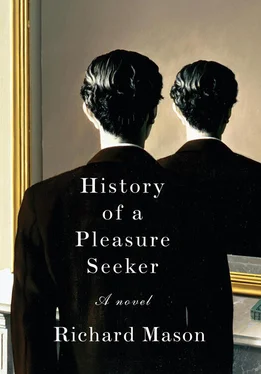Louisa Vermeulen-Sickerts was dark and grave and looked older than her nineteen years. She was wrapped in a twist of pale gray muslin that made her mother’s green velvet look fussy and uncomfortable. “Good evening,” she said, with neutral friendliness.
Jacobina rang a bell, and Didier Loubat appeared, carrying a silver stand of oysters on crushed ice. They all sat down. Piet took in the handwritten menu in front of him, the four crystal vases of orange roses that decorated the table, the two silver dishes piled high with blood oranges on the sideboard, and felt wonderfully proud of himself. If Louisa had expected him to be confounded by the oysters or the langoustines or the quail à la minute , she was disappointed — because Nina Barol had foreseen just this eventuality and twice a year had served Piet the delicacies of her youth so that he might dine in sophisticated company one day, without shame.
They were waited on by Agneta Hemels and Hilde Wilken, who handed the dishes while Didier Loubat poured the wine and Mr. Blok carved the beef that followed the quail. Piet fielded the girls’ questions about his life in Leiden truthfully but without revealing that indoor plumbing was a novelty for him. When he ate the pickled asparagus with his fingers, as he knew from his mother was proper, he detected a silent exchange between them and felt that he had passed a further test. He noticed that both girls were offered the Château Margaux and that they spoke to their parents without formality. Constance was the voluble one, but Louisa appeared to appreciate her talkativeness and not resent it. She laughed with everyone else at her sister’s wicked account of a young man’s tumble on the van Sproncks’ ballroom floor the night before and only joined the talk when it turned to the guests’ clothes.
“Louisa is in revolt against impractical female fashions,” said Constance, “and abhors killing animals to embellish them. She intends to open a shop.”
“She’ll have crowned heads for clients one day, mark me.” Maarten Vermeulen-Sickerts spoke in the genial tone of a man who applauds his child’s spirited imaginings, without remotely believing in them. He loved having two rich daughters. Watching Constance and Louisa converse with Piet across the table, he felt enormously blessed. That two such soft young women, whose sole labor was to dance and dine with their friends; to wear pretty clothes and flirt and enjoy themselves; who spent money with such innocent disregard for its value and were capable of being moved to tears by something as insignificant as a rabbit skinned for its pelt; that they should be his; that they should live in this house that was his, with its distinctions and taste, its furniture and china and carpets and clocks and exquisitely trained staff, the best-paid servants on the Herengracht — all this was a source of deep satisfaction to him.
Such achievements might have led to the sin of pride, had it not been for Egbert. But as he looked at the young man who was now his tutor, who asked such intelligent questions and whose manners were commendably amiable and discreet, he began to feel optimistic about his son’s chances. Surely he must look up to a fellow like this, he thought; and he felt a twinge of relief that responsibility for Egbert’s developing masculinity was no longer his alone.
They took coffee in the private salon on the first floor. It was a cozy room with a piano and piles of illustrated magazines and an Aubusson carpet that caught the colors of the ceiling, which showed heaven glimpsed through parted clouds.
“Jacob de Wit. Dawn Banishing the Figures of Night ,” said Maarten, when Piet admired it. He had bought the canvas three years before and paid a fair price although its owners were bankrupt and would have settled for less. He had altered the whole room to accommodate it. “Rather fine, don’t you think?”
“Very fine, sir.”
Constance and Louisa sat together on a cushioned daybed between the bookcases. Once Hilde Wilken had handed round the petit fours and deposited the tray of Meissen cups and steaming pots before Jacobina, Constance said, with a note of friendly challenge in her voice, “Entertain us, Mr. Barol.”
Piet could play bridge and discuss with authority the paintings of several “Living Masters.” He read very well, with a deep sonorous voice equally suited to Scripture and fiction. He also had a number of well-turned anecdotes, refined by repetition; such a range, in fact, that the introduction of one to the general conversation rarely seemed forced. Tonight he sensed instinctively that music was required, not words. With a little bow he rose and went to the piano.
Nina Barol had taught Piet not only to accompany her students but to sing with them, too. As a little boy he had taken the soprano role in duets with aspiring tenors and when his voice broke had continued to sing these parts in a sweet falsetto. This facility had developed into a party trick of proven impact. Piet knew that the spectacle of a man like him singing in the high, true voice of a boy was alluring, that it delighted women and pacified the competitive instincts of other men. He sat down on the piano stool and told the touching anecdote of how his adored mother, now dead, had taught him to sing the female parts of the great operas.
“Why don’t you give us something from Carmen , Mr. Barol?” said Jacobina, hardly looking up from her embroidery.
“Oh do!” cried Constance. “I adore Bizet.”
Nina Barol had seen the premiere of Carmen and been conquered for life. She had sung Piet to sleep after childhood nightmares with Micaëla’s song of a mother who loves her child and sends him money and forgiveness and a kiss. But it was not maternal affection the situation called for. Piet looked at his new employer, beaming by the fireplace as Didier Loubat poured him a brandy, and felt a pulse of thrilling, compulsive guilt. He liked Mr. Vermeulen-Sickerts. He felt instinctively that they could be friends, but the inspiration sparked by Jacobina’s sly suggestion was too brilliant to ignore.
He sat down at the piano, paused once to pacify his conscience, and began the aria Carmen sings to Don José, in which she promises to take him carousing on the ramparts of Seville if he risks prison for her sake. “Yes, but it’s dull to be alone,” he sang, devilishly. “True pleasure requires a pair.”
Didier Loubat replaced the decanter of brandy on the cocktail tray and stood silently by the door, his face absolutely expressionless. Hilde Wilken took an empty coffee cup from Constance’s hand and curtsied. She looked at Didier, whom she loved desperately; to whom she had rendered her carefully preserved virginity. She did not speak French and did not understand the words Piet sang. But she caught the erotic charge of the music and when Didier did not return her glance, as he so easily might have done, she knew suddenly that he did not love her back; that he was bored of her. It was a certainty that had been creeping up on her, stealthily, for some time. As it sunk its claws into her back she thought she might faint. Instead she picked up the tray and left the room, digging her nails into the flesh of her palms to guard against tears.
On the other side of the door, Piet was singing, “My poor heart, so easily consoled, my heart is as free as the air.” He was giving it beautifully and he knew it. “I have admirers by the dozen, but none of them are to my taste.”
It was a devastating choice, because the words gave form to feelings within Jacobina of which she had been quite unaware even six hours before. Her heart was poor and worthy of consolation. She longed to feel as free as air. She thought of the dozens of suitors who had adorned her youth and glanced at her husband. Then she looked at Piet, a young galent entirely to her taste; and though she knew that she should be ashamed of herself for inviting this peacock into her nest, in fact she felt as though life had taken an exciting turn.
Читать дальше












